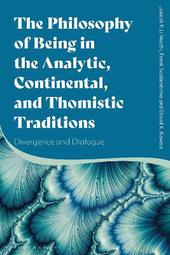
|
The Philosophy of Being in the Analytic, Continental, and Thomistic Traditions: Divergence and Dialogue
Hardback
Main Details
Description
This book provides a discussion of the philosophy of being according to three major traditions in Western philosophy, the Analytic, the Continental, and the Thomistic. The origin of the point of view of each of these traditions is associated with a seminal figure, Gottlob Frege, Immanuel Kant, and Thomas Aquinas, respectively. The questions addressed in this book are constitutional for the philosophy of being, considering the meaning of being, the relationship between thinking and being, and the methods for using thought to access being. On the one hand, the book honors diversity and pluralism, as it highlights how the three traditions may be clearly and distinctly differentiated regarding the philosophy of being. On the other hand, it honors a sense of solidarity and ecumenism, as it demonstrates how the methods and focal points of these traditions constitute, and continue to shape, the development of Western philosophy. This book contributes toward an essential overview of Western metaphysics and will be of particular interest to those working in the history of philosophy and in the philosophy of being.
Author Biography
Joseph P. Li Vecchi is Associate Professor of Philosophy at the University of Akron, USA. Frank Scalambrino is a Registered Psychotherapist and Professor of Philosophy and Psychology working in Colorado Springs, Colorado, USA. David K. Kovacs is Robert Bellarmine Postdoctoral Fellow at Loyola Marymount University, USA.
ReviewsThis book engages with an important philosophical topic. It will help people interested in that topic to get a sense of how it has been discussed in the past and how it might be approached today. * Brian Davies, Distinguished Professor of Philosophy, Fordham University, USA * This book offers an original and provocative contrasting of the Thomistic, Continental, and Analytic traditions in their approach to the question of being. It will be of interest to students and scholars alike who seek to situate these philosophical traditions in relation to one another. The concluding dialogue between the three authors is especially illuminating and insightful. * William McNeill, Professor and Chair of Philosophy, DePaul University, USA *
|